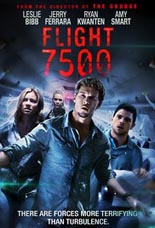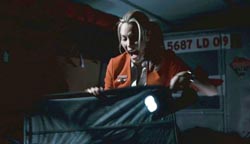
 No offense is meant to Leslie Bibb, a genial actress with bona fide comedic flair (from Talladega Nights to Hell Baby), but she looks as if she were genetically engineered to play a flight attendant. Her striking, all-American features combine for the kind of friendly face commercial air carriers look for when employing ambassadors for beverage service at 37,000 feet. While Bibb’s Laura may be an ideal hire for the fictional Vista Pacific Airlines, she cannot save Flight 7500 from interminable boredom. The film is flawed from its initial taxi down the runway.
No offense is meant to Leslie Bibb, a genial actress with bona fide comedic flair (from Talladega Nights to Hell Baby), but she looks as if she were genetically engineered to play a flight attendant. Her striking, all-American features combine for the kind of friendly face commercial air carriers look for when employing ambassadors for beverage service at 37,000 feet. While Bibb’s Laura may be an ideal hire for the fictional Vista Pacific Airlines, she cannot save Flight 7500 from interminable boredom. The film is flawed from its initial taxi down the runway.
Passengers board a red-eye flight that will take them from Los Angeles to Tokyo … or at least that’s the intent. With air travel, so many variables loom as threats: severe weather, mechanical failure and, if your movie’s director is Japanese, a high probability of a supernatural haunting. With The Grudge’s Takashi Shimizu in the proverbial cockpit here, the latter is at play: an invisible force that chokes the life out of frequent fliers in the most predictable and detaching ways.
 One wonders if Shimizu and screenwriter Craig Rosenberg (2009’s The Uninvited, an underrated spooker) have attempted to imbue this routine horror film with a statement on the state of the modern marriage in these United States. Consider that Laura is playing “Coffee, tea or me?” with the married pilot (Jonathon Schaech, The Legend of Hercules), and that the other four main characters are either in a dissolved union (Crank’s Amy Smart and Knights of Badassdom’s Ryan Kwanten) or newly part of one already doomed to collapse (Hall Pass’ Nicky Whelan and Entourage’s Jerry Ferrara).
One wonders if Shimizu and screenwriter Craig Rosenberg (2009’s The Uninvited, an underrated spooker) have attempted to imbue this routine horror film with a statement on the state of the modern marriage in these United States. Consider that Laura is playing “Coffee, tea or me?” with the married pilot (Jonathon Schaech, The Legend of Hercules), and that the other four main characters are either in a dissolved union (Crank’s Amy Smart and Knights of Badassdom’s Ryan Kwanten) or newly part of one already doomed to collapse (Hall Pass’ Nicky Whelan and Entourage’s Jerry Ferrara).
Or at least I wondered that, because the movie failed to grab me, and when it comes to horror, I’m a fairly easy lay. It’s no wonder Flight 7500 took four years to land a stateside release on DVD, after originally being made for theaters. While Shimizu is a competent filmmaker, this elicits not even a fraction of the fear of his greatest hit (or hits, plural, if you lump in his own remake). While welcome, the ending succeeds only in insulting its audience, followed by an unscary jump scare that doesn’t even make sense within the story’s timeline. —Rod Lott
